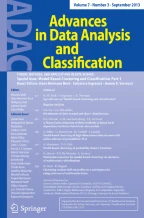Abstract
The Ministry of Social Development in Mexico is in charge of creating and assigning social programmes targeting specific needs in the population for the improvement of the quality of life. To better target the social programmes, the Ministry is aimed to find clusters of households with the same needs based on demographic characteristics as well as poverty conditions of the household. Available data consists of continuous, ordinal, and nominal variables, all of which come from a non-i.i.d complex design survey sample. We propose a Bayesian nonparametric mixture model that jointly models a set of latent variables, as in an underlying variable response approach, associated to the observed mixed scale data and accommodates for the different sampling probabilities. The performance of the model is assessed via simulated data. A full analysis of socio-economic conditions in households in the Mexican State of Mexico is presented.
Similar content being viewed by others
References
Bandyopadhyay D, Canale A (2016) Non-parametric spatial models for clustered ordered periodontal data. J R Stat Soc Ser C 65:619–640
Banfield JD, Raftery AE (1993) Model-based Gaussian and non-Gaussian clustering. Biometrics 49:803–821
Barnard J, McCulloch R, Meng X-L (2000) Modeling covariance matrices in terms of standard deviations and correlations, with application to shrinkage. Stat Sin 10:1281–1311
Barrios E, Lijoi A, Nieto-Barajas LE, Prünster I (2013) Modeling with normalized random measure mixture models. Stat Sci 28:313–334
Box GEP, Cox DR (1964) An analysis of transformations (with discussion). J R Stat Soc B 26:211–252
Cai JH, Song XY, Lam KH, Ip EH (2011) A mixture of generalized latent variable models for mixed mode and heterogeneous data. Comput Stat Data Anal 55:2889–2907
Canale A, Dunson DB (2011) Bayesian kernel mixtures for counts. J Am Stat Assoc 106:1528–1539
Canale A, Dunson DB (2015) Bayesian multivariate mixed-scale density estimation. Stat Interface 8:195–201
Canale A, Scarpa B (2016) Bayesian nonparametric location-scale-shape mixtures. Test 25:113–130
Carmona C, Nieto-Barajas LE (2017) Package BNPMIXcluster. R package version 1.2.0
Chambers RL, Skinner CJ (2003) Analysis of survey data. Wiley, Chichester
CONEVAL (2009) Metodología para la medición multidimensional de la pobreza en México. Consejo Nacional de Evaluación de la Política de Desarrollo Social, México. http://www.coneval.org.mx/rw/resource/Metodologia_Medicion_Multidimensional.pdf (in Spanish)
Dahl DB (2006) Model-based clustering for expression data via a Dirichlet process mixture model. In: Vanucci M, Do K-A, Müller P (eds) Bayesian inference for gene expression and proteomics. Cambridge University Press, Cambridge
Everitt BS (1988) A finite mixture models for the clustering of mixed-mode data. Stat Probab Lett 6:305–309
Ferguson TS (1973) A Bayesian analysis of some nonparametric problems. Ann Stat 1:209–230
Fernández D, Arnold R, Pledger S (2016) Mixture-based clustering for the ordered stereotype model. Comput Stat Data Anal 93:46–75
Ishwaran H, James LF (2001) Gibbs sampling methods for stick-breaking priors. J Am Stat Assoc 96:161–173
Kingman JFC (1975) Random discrete distributions. J R Stat Soc B 37:1–22
Kottas A, Müller P, Quintana F (2005) Nonparametric Bayesian modeling for multivariate ordinal data. J Comput Graph Stat 14:610–625
Leon-Novelo LG, Zhou X, Nebiyou Bekele B, Müller P (2010) Assessing toxicities in a clinical trial: Bayesian inference for ordinal data nested within categories. Biometrics 66:966–974
Lumley T (2010) Complex surveys. Wiley, Hoboken
McLachlan GJ, Basford KE (1988) Mixture models: inference and applications to clustering. Marcel Dekker, New York
McParland D, Claire Gormley I, McCormick TH, Clark SJ, Whiteson Kabudula C, Collinson MA (2014) Clustering South African households based on their asset status using latent variable models. Ann Appl Stat 8:747–776
Navarrete C, Quintana FA, Müller P (2008) Some issues in nonparametric Bayesian modeling using species sampling models. Stat Model 8:3–21
Nieto-Barajas LE, Contreras-Cristán A (2014) A Bayesian nonparametric approach for time series clustering. Bayesian Anal 9:147–170
Norets A, Pelenis J (2012) Bayesian modeling of joint and conditional distributions. J Econom 168:332–346
Pitman J (1995) Exchangeable and partially exchangeable random partitions. Probab Theory Relat Fields 102:145–158
Pledger S, Arnold R (2014) Multivariate methods using mixtures: correspondence amalysis, scaling and pattern-detection. Comput Stat Data Anal 71:241–261
Pitman J, Yor M (1997) The two-parameter Poisson–Dirichlet distribution derived from a stable subordinator. Ann Probab 25:855–900
R Core Team (2016) R: a language and environment for statistical computing. R Foundation for Statistical Computing, Vienna. https://www.R-project.org/
Ritter C, Tanner MA (1992) Facilitating the Gibbs sampler. The Gibbs stopper and the Griddy-Gibbs sampler. J Am Stat Assoc 87:861–868
Rodríguez CE, Walker SG (2014) Univariate Bayesian nonparametric mixture modeling with unimodal kernels. Stat Comput 24:35–49
Tierney L (1994) Markov chains for exploring posterior distributions. Ann Stat 22:1701–1762
Wade S, Ghahramani Z (2017) Bayesian cluster analysis: point estimation and credible balls. Bayesian Anal. https://doi.org/10.1214/17-BA1073
Acknowledgements
The authors are grateful to the constructive comments of a guest editor and two anonymous referees. The first author acknowledges support from Consejo Nacional de Ciencia y Tecnología, Mexico. The second author acknowledges support from Asociación Mexicana de Cultura, A. C. Mexico. The third author is also affiliated with the Collegio Carlo Alberto and acknowledges support of Grant CPDA154381/15 from the University of Padua, Italy.
Author information
Authors and Affiliations
Corresponding author
Rights and permissions
About this article
Cite this article
Carmona, C., Nieto-Barajas, L. & Canale, A. Model-based approach for household clustering with mixed scale variables. Adv Data Anal Classif 13, 559–583 (2019). https://doi.org/10.1007/s11634-018-0313-6
Received:
Revised:
Accepted:
Published:
Issue Date:
DOI: https://doi.org/10.1007/s11634-018-0313-6
